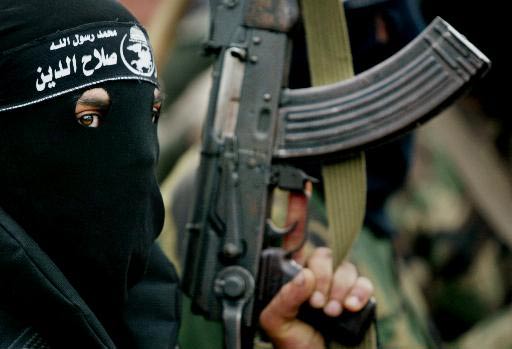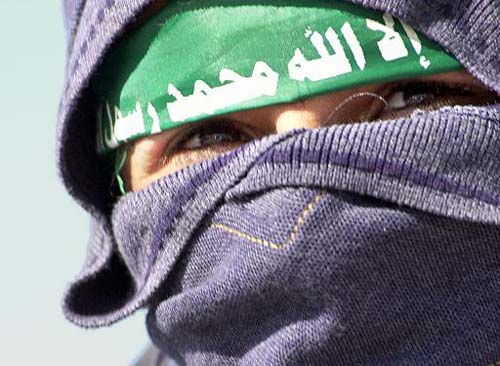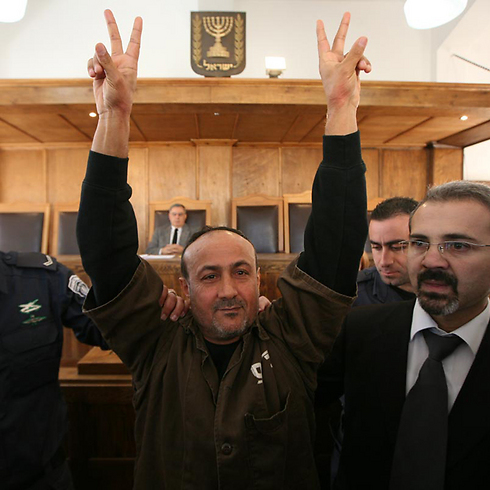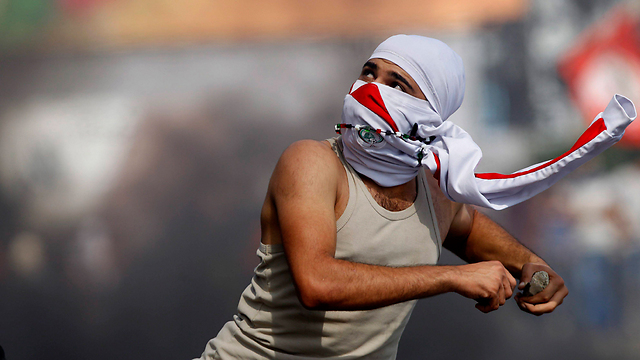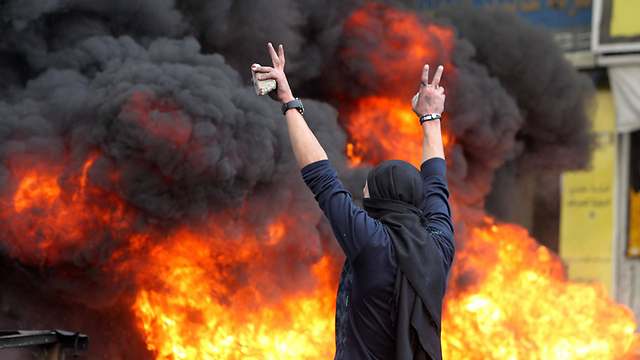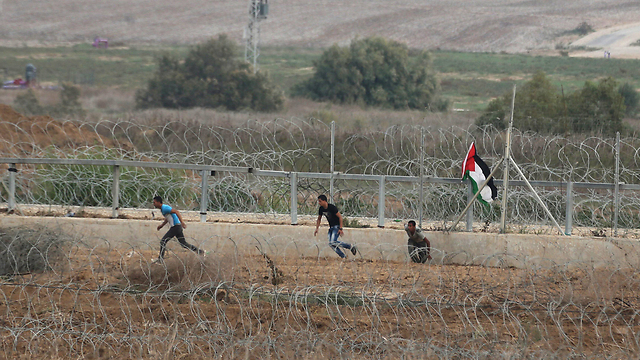Fatah on the verge of eruption
IDF troops that entered Shuafat refugee camp this week had to withdraw after encountering dozens of armed militants; this is only an example of what might happen when Fatah's armed wing, Tanzim, joins the fight against Israel. And they won't do with just knives: There are thousands of weapons all over East Jerusalem.
These militants have no problem with appearing on camera, on Channel 2 for example, just as they had no quams about opening fire at an IDF force that went into Qalandiya last Saturday to arrest a wanted man who already spent a year and a half in prison.
"So are YOU going to go in there and get the weapons out, or are you going to leave it to us?" the Israeli security officials respond in anger whenever anyone accuses them of sitting on their hands and doing nothing - implying that the Israeli security forces are afraid to enter a refugee camp under their control in order to demilitarize the Tanzim.
Even Israel admits that there is an arsenal of some 3,000 weapons inside the Shaufat refugee camp. The figure includes M-16 and kalashnikov assault rifles, grenades, and IEDs (improvised explosive devices).
Last Saturday night, an army force entered the camp to take measurements of a home set to be demolished. Several dozen militants surrounded the building and made it abundantly clear that they were willing to die in order to stop the structure from being demolished. This is the mood in Palestinian neighborhoods of Jerusalem. The army will have to come back there, with more forces, in order to complete preparations. And now it's clear that demolishing terrorists' homes - a countermeasure promised by the Israeli government - will entail fighting dozens of militants who have been left unchecked for years.
Tanzim power structure
Israeli security officials tend to dismiss the knife-wielding terrorists, presenting them as proof of the weakned status of the more established Palestinian terrorist organizations. Except that for a Muslim, the knife is the symbol of the fight for the holy places, in the spirit of the "sword of Islam." Muslims don’t view the use of a knife as an act of desperation and wretchedness, but an act of bravery. So the less friction on the Temple Mount - which would lead to the lowering of religious tensions - the less stabbing attacks we'll have.In the current wave of violence, the stabbing attacks are just ripples in the ocean. The statistics surrounding these "lone-wolf attacks" don't accurately reflect the level of violence accumulating on the Palestinian street. Israeli security officials are more concerned with these massive tidal waves that have a far bigger potential of dangerously erupting.
Indeed, when the IDF prepares to face a long-term wave of violence, it takes into consideration the eventuality that at any given moment- and without prior warning - thousands of militants in the West Bank, mostly affiliated with Fatah's Tanzim, could join the fight.
In its early days, Tanzim was a secret organization compiled of local political activists, students, and released prisoners, which executed Fatah's policies: Be it social activities, organizing support rallies for the regime, or rioting against Israel. Later, during the second intifada, Tanzim's militants committed terror attacks against Israeli security forces and civilians, including the terror attack in Kibbutz Metzer, where five people were murdered - including a mother and her two children.
The basic structure of the organization remains, and nowadays it serves as Fatah's "shadow army" operating on the Palestinian street, alongside the PA's security forces.
However, the ties between the heads of Tanzim and the Mukataa in Ramallah are growing weaker by the day. Abbas' security forces can't enter some of the refugee camps because the Tanzim militants kick them out.
Two months ago, when there was talk of the day after Abbas, Tanzim threatened the heads of Fatah that if it didn't get its share of the leadership pie, they would launch attacks against Palestinian security facilities and take them by force.
Tanzim's militants are spread over ten districts of the West Bank. East Jerusalem is one of these districts. Each district is divided into sub-districts, and then further divided into neighborhoods, villages, ect. The smallest unit is the "Jannah," and it that might also be a bunch of huts outside a village. Every such unit - from the district to the Jannah - has commanders. Today, when these groups sense Abbas' weakness and the crumbling of his regime, they go out on the street armed, in broad daylight. This is an act of defiance not just against the Palestinian Authority, but also against Israel.
After the second intifada, Israel and the Palestinian Authority, under the auspices of the Americans, signed a pardon agreement for wanted militants. The agreement dictated that the Fatah militants who fought as part of the Al-Aqsa Martyrs' Brigades during the second intifada would cease their involvement in terrorism and disarm. Israel, in return, would stop pursuing them. It turns out that some of the armed Tanzim militants of today are the same wanted militants from the distant past - the same ones who committed not to carry arms. So even that agreement has fallen apart.
The arson at Joseph's Tomb last weekend might have been an anti-Jewish provocation, but it also demonstrated how little regard the Palestinian militant groups have for the Palestinian security forces. Joseph's Tomb is only 400 meters away, in a straight line, from a central Palestinian security forces base. The perpetrators acted against the PA's interests, and right under its nose. They just don't give the Palestinian security forces the time of day.
As long as Tanzim militants did not walk around brandishing their weapons in public, Israel and the PA turned a blind eye. Now, they are emerging as a significant and central player, fervently courted by the Fatah leadership. Those seeking to inherit Abbas' seat need the Tanzim divisions on their side. The mounting tensions, the political situation and the anarchy on the street are pushing both Tanzim militants and those courting them to take more extreme positions, and call for an armed conflict against Israel.
Jibril Rajoub, for example, is one of the ten candidates to succeed Abbas. When this wave of violence just started, Rajoub was still urging the Palestinian security forces to hold a dialogue with Israel and now, this week, he changed his tune to a far more extreme position, encouraging the knife-wielding terrorists, as if he was competing with Hamas over who has the most inflammatory rhetoric. Rajoub wants to win back the hearts and minds of the Palestinian people, Israeli officials explain, and the Palestinian people want blood. Rajoub views himself as one of the leaders of Tanzim, and this kind of rhetoric only serves to increase his popularity on the Palestinian street.
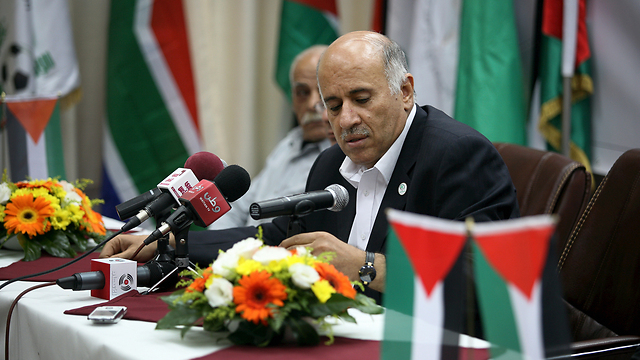
Several of Abbas' potential successors even formed coalitions to bring Tanzim to their side. For example, the coalition of Abbas' rivals, headed by Mohammed Dahlan, which also includes Yasser Abed Rabbo (the former secretary-general of Fatah's executive committee, who was removed from office) and Salam Fayyad (the former Palestinian prime minister who was also removed from office). This coalition seeks to bring in Marwan Barghouti, who is imprisoned in Israel, as a symbol. It also has money, and a lot of it, that Dahlan brought with him from the Gulf monarchies, in order to buy Tanzim’s loyalty.
Then there's also the group of Abbas allies, like Majid Faraj, the head of the Palestinian security forces, and Saeb Erekat, the chief negotiator with Israel.
They face other potential candidates to succeed Abbas, like Muhammad al-'Alul - the former governor of Nablus and one of the more senior members of the Tanzim leadership, who’s been there since the first intifada.
All of these candidates have their sights on the militant organization, trying to appropriate it. The fight for Tanzim creates a kind of conduct and comments that are becoming more and more extreme.
Eisenkot's West Bank forum
This week, Abbas finally realized the kind of trap he walked into. In a desperate attempt to stop the escalation, he tried to reframe the fight with a new slogan: "Smart Resistance." Wednesday’s editorial in the PA's mouthpiece Al-Hayat al-Jadida warns against the situation getting out of control, which could hurt the Palestinian people's quality of life. The term "third intifada" is not mentioned.
Abbas' former slogan, "Peaceful Resistance," is no longer relevant. As long as the resistance only included stone-throwing, rioting, and Molotov cocktails, Abbas would congratulate the "shahids" who committed these actions. He was against terrorism in principle, but not to this kind of activity. But the moment the PA started encouraging violence of any kind - it was inviting that escalation. And when the knives started appearing and Abbas was unwilling to condemn the stabbers, it came back to him like a boomerang. The Palestinian street no longer accepts the PA's authority. Young rioters don't heed the calls of the Palestinian security forces, Hamas, or anyone else for that matter. That is why the PA leadership is now talking about a "Smart Resistance": To bring the knives back into the kitchen, because the Palestinians will pay dearly for this escalation. But it appears Abbas has already missed the train.
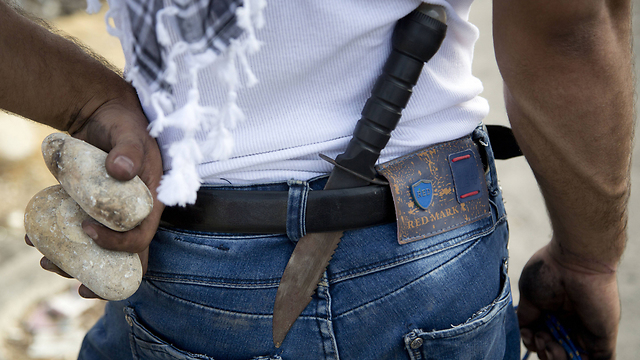
In war games held by the IDF's Central Command on the eve of Abbas' speech at the UN General Assembly meeting last month – with Israeli officials worried about an inflammatory speech that would set the Palestinian street on fire - the army drilled several scenarios of a loss of control over the West Bank.
The first scenario: A wave of lone-wolf attackers dragging the entire Palestinian street into all-out violence. This scenario is defined as low-level violence, and it is unfolding right now.
The second scenario was of a violent outburst inside the refugee camps that would enlist Tanzim to an armed struggle that would set the West Bank on fire. This is the scenario currently worrying Israel's defense establishment. That is why Defense Minister Moshe Ya'alon instructed the army to prepare for long-term deployment of increased forces in the West Bank, including the possibility of switching out the conscript soldiers in the West Bank with reservists, to allow the army to resume its regular training schedule.
Assignments for the reservists have already been determined, and starting December they too will be deployed in the West Bank. There will be a price to pay for the reservists - there'll make more mistakes out in the field - but the army has been on high alert in the West Bank for a month now, and it is unclear when that would end. So calling up the reserves at this point appears like a necessary step.
Facing constantly increasing levels of terrorism, the IDF's General Staff is also focusing on preparing long-term plans. Chief of Staff Gadi Eisenkot holds at least three weekly meetings with a team of senior officers who rose up the ranks while fighting terrorism in the West Bank. Among them is Deputy Chief of Staff, Maj.-Gen. Yair Golan, who was the commander of the Judea and Samaria Division; the head of Army Intelligence, Maj.-Gen. Herzl Levy, who was the commander of the Jenin Brigade; the head of the Operations Branch, Maj.-Gen. Nitzn Alon, who was the commander of the Judea and Samaria Division and the GOC Central Command; the current GOC Central Commander, Maj.-Gen. Roni Numa; COGAT Maj.-Gen.
Yoav Mordechai; the head of the Operations Division, Brig.-Gen. Aharon Haliva, who commanded over the Tulkarm-Qalqilya sector; and of course the current Judea and Samaria Division commander, Brig.-Gen. Lior Carmeli, who served in the past as the head of the Jenin Brigade. Not to mention Shin Bet chief Yoram Cohen and the commander of the Shin Bet's Jerusalem District, in charge of the West Bank, who served in Hebron for 17 years.
The army wants to send a message that it put its best people on the job – senior officers with the most experience fighting against the Palestinians in the West Bank that the army has. There's more than a subtle hint here to the attempts of politicians to challenge the defense establishment's judgment with bizarre ideas, meant solely to bring the situation to a boiling point in order to create a new reality on the ground vis-à-vis the Palestinians.
For example, Bayit Yehudi Minister Uri Ariel's call to stop the transfer of funds to the Palestinian Authority. On paper, this is an innocuous and logical proposal. They owe over NIS 1.5 billion to the Israel Electric Corporation, so why do we need to pay their bills? After all, those funds are also paying the stipends given to families of terrorists.
Except that army officials who are in communication with the Palestinian security forces have received a very clear message from them: Don't you dare touch our tax money. If the funds don't come in, there will be no money to pay policemen's salaries. No salaries? Those policemen won't be out in the field or worse - they'll join the ranks of Tanzim or Hamas.
And this is what Minister Ariel and his ilk want: Anarchy.
The defense establishment is fighting tooth and nail to stop the approval of a proposal from right-wing ministers to impose a blockade on the West Bank. The government has accepted the defense establishment's position. The ball is now in the prime minister's court. The moment Netanyahu caves in and surrenders to the pressure coming from the extreme right - the IDF will no longer be able to stop an all-out armed conflict.
It was no coincidence that the defense minister - in a speech he made this week - chose to speak against the inciters, the "price tag" people, and the like. The defense establishment is aware of the potential threat of Jewish violence. The most effective weapon the defense minister has against Jewish extremists in the West Bank is Israeli public opinion, which won’t accept such conduct from hawkish ministers and settler leaders on the ground.
The heads of the Palestinian security forces are having a hard time keeping their men in line. There were already several "rebellions" by Palestinian security personnel who tried to commit attacks - and were thwarted. The heads of the Palestinian security forces are pleading with Israel to minimize the amount of casualties in clashes with Palestinians, to keep out of Area A, and not deny them the funds to pay salaries.
Snipers instead of aerial fire
On October 16, Palestinian security forces arrested two terror cells: One belonging to Hamas and the other to the Popular Front for the Liberation of Palestine. According to intelligence obtained by the PA, the Hamas cell planned to commit a big terror attack meant to rile up the Palestinian street and weaken the Palestinian Authority.
Israel has no reason to doubt the credibility of this report. A similar incident occurred, on a much larger scale, on the eve of Operation Protective Edge. At the time, the Shin Bet exposed a Hamas plot including dozens of operatives planning to commit several major terror attacks against Israel and the Palestinian Authority in an effort to bring down Abbas.
Hamas is currently fighting on three separate fronts, leading a different policy in each of them. In Jerusalem, Hamas is working to take over the Temple Mount. In the West Bank, it's making every effort to execute a large-scale terror attack that would serve as the final nail in the coffin for the Palestinian Authority as it is today. The large sums of money feeding the propaganda Hamas is spreading through social media as well as traditional media is coming from Istanbul, from the Hamas headquarters in Turkey.
Saleh Al-Aruri, who was exiled to Qatar by the Turkish government several months ago, has returned to Istanbul with the Turks' consent, and is leading Hamas' a campaign of propaganda and incitement under the slogan "Stab, stab!" This message is falling on attentive ears not just in East Jerusalem and among Palestinians illegally staying in Israel, but also in the West Bank, mostly in the Hebron area, where quite a few stabbing attacks occurred over the past week.
In recent days, the incitement coming out of Turkey has been working to change the focus from stabbing attacks to vehicular attacks. Hamas believes the stabbing attacks have exhausted themselves, even though there were quite a few of them taking place in the West Bank this week, mostly in the Hebron area. The vehicular attacks are far more effective. And, indeed, there has been a rise in vehicular attacks in recent days.
In the Gaza Strip, on the other hand, Hamas lets the Palestinians to blow off steam, but keeps it under control, and stops, by all means possible, any rocket fire at Israel. Twelve Gazans have been killed in clashes with IDF forces on the border fence and in airstrikes, without any response from Hamas.
The field is flooded with IDF snipers, and over the past few days protesters have failed to cross the border fence. The IDF is also trying not to give Hamas a reason to change its policy in the Gaza Strip. When snipers fired from inside the Strip, hitting an Israeli vehicle, the army considered a targeted strike from the air. But out of operative considerations, the IDF decided instead to hit back with sniper fire. By the way, these Gazan snipers were part of an organization that broke away from Hamas.
Hamas is playing these three different games with a lot of caution and without any confusion. The organization's basic assumption is that Israel won't launch another conflict in the Gaza Strip over a terror attack initiated by Hamas in the West Bank.
The Palestinian security forces were not the only ones arresting Hamas operatives in the West Bank. The IDF conducted its own raids, arresting both military and political figures. One such political figure was Hassan Yousef, who is considered the head of Hamas in the West Bank, and who Israel accuses of incitement. But what these arrests are actually meant to do is signal Hamas that Israel will trample the organization's presence in the West Bank, just as it did during Operation Brother's Keeper, after the kidnapping and murder of the three yeshiva students in the summer of 2014.
During a situation assessment meeting held in Israel after the arrests, one of the officers compared dealing with Hamas to going to the family health center. Every once in a while, people like Hassan Yousef need to be brought in to see how much weight he gained, how high he got and check his mental state. A sort of litmus paper for the way the wind blows in the West Bank. The problem is that at this family health center, there are no innocent babies or kind nurses. The players in the triangle of Israel-West Bank-Gaza have already realized that the era of knife-wielding attackers could very well be one day remembered as normal compared to what the Palestinian street knows, could and might do.










